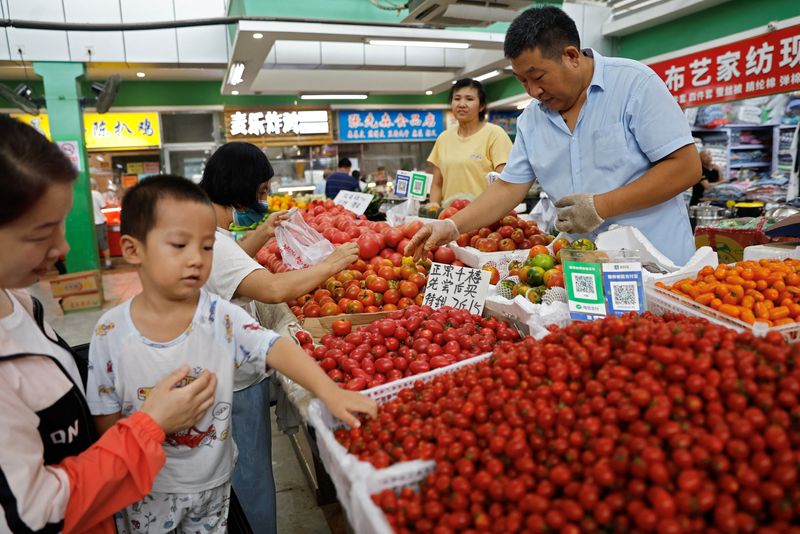By Liangping Gao and Ryan Woo
BEIJING (Reuters) -China's consumer inflation held steady in May while producer price declines eased, but the underlying trend suggests Beijing would need to do more to prop up feeble domestic demand and an uneven economic recovery.
Weak consumption in China has kept a lid on consumer prices since 2023 despite many rounds of support measures as confidence remains low amid a protracted property sector crisis. Economists say a further round of stronger and coordinated fiscal and monetary stimulus steps are required to sustainably drive up demand.
The consumer price index (CPI) rose 0.3% in May from a year earlier, matching a gain in April, data from the National Bureau of Statistics (NBS) showed on Wednesday, below a 0.4% increase forecast in a Reuters poll.
Producer prices, which were stuck in deflation since September 2022, fell at a slower 1.4% pace in May after contracting 2.5% in April, and compared with a forecast 1.5% decline.
"I think the deflationary pressure has not faded yet," said Zhiwei Zhang, chief economist at Pinpoint Asset Management.
"The improvement in PPI is largely driven by commodity prices such as copper and gold, which is not a reflection of China’s domestic demand," he said.
Zhang's view was backed by the weak month-on-month CPI gauge, which was down 0.1% against a 0.1% rise in April and compared with economists forecasts for zero growth.
Asian shares were subdued, while China's blue chips were down slightly at the midday break following the data.
"For investors, the key question is whether China's PPI inflation could turn positive in the second half of this year, given the recent rise in commodity prices, particularly copper," said Zhou Hao, chief economist at Guotai Junan International.
"Overall, today's inflation report suggests that a moderate reflation is still ongoing, while a low inflation is likely to remain the base case," Zhou added.
China's economy has struggled to motor on despite the end of stringent COVID curbs in late 2022, mainly due to the ripple effects of a prolonged property sector crisis on investor, business and consumer confidence.
Beijing has rolled out several measures to spur demand in the housing sector and launched other schemes to boost consumer sentiment, including offering government-subsidised incentives to spur trade-ins of autos and other consumer goods.
It has also vowed to create more jobs linked to major projects, roll out measures to promote domestic demand targeted for youths and has pledged greater fiscal stimulus to shore up growth.
Wednesday data on the core inflation measure, which excludes volatile food and energy prices, underlined the challenge facing Beijing in its efforts to boost domestic demand. The gauge stood at 0.6% in May year-on-year, slowing from 0.7% in April.
Zichun Huang, China economist at Capital Economics, said persistent industrial overcapacity will likely keep the rebound in consumer inflation "very modest", and expects it to average a 0.5% pace this year.
Many economists expect Beijing to unveil more support measures in coming months to keep the economy on track to reach its GDP growth target of "around" 5% for this year, and foster a sustainable rebound. Most, however, say that authorities must roll out a comprehensive fiscal and monetary policy package to inject confidence and get households and businesses spending again.

Last month's historic measures to stabilise the beleaguered property sector, for instance, have been widely seen by markets and investors as insufficient.
"A more comprehensive and proactive policy stance covering fiscal, monetary, and property sector may be necessary to boost domestic demand more effectively," Pinpoint's Zhang said.